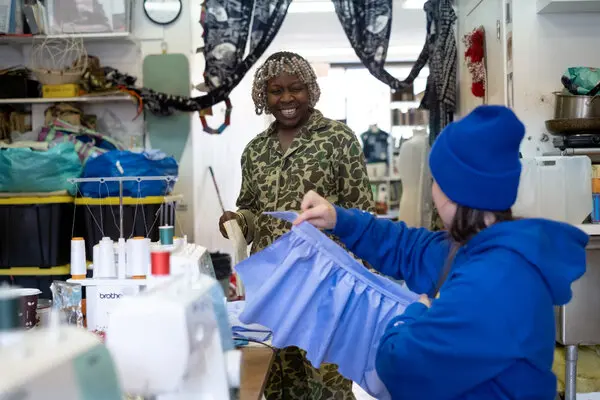How a Fashion Designer and Sewing Teacher Spends Her Sundays
Share
Explore Our Galleries
Breaking News!
Today's news and culture by Black and other reporters in the Black and mainstream media.
Ways to Support ABHM?
By Jane Margolies, New York Times
Hekima Hapa runs around with her four children, teaches a sewing class in Brooklyn and ends her day by burning a little sage.

Hekima Hapa, an artist and fashion designer who lives and works in the Bedford-Stuyvesant neighborhood of Brooklyn, learned to sew from her mother, who made all the family’s clothes as well as the curtains and quilts in their Florida home.
But when Ms. Hapa, 52, decided to teach her own older daughter to sew over a decade ago, she couldn’t find inspirational photos of Black girls making things of their own with a needle and thread.
“There were Black women doing hair weaves and working in garment factories, but nothing that showed a mom and daughter sewing together,” she said.
So she founded the nonprofit Black Girls Sew and co-wrote a book of the same name. She now offers classes and a summer day camp in a storefront she rents from a local church. Girls she has taught have gone on to attend the High School of Fashion Industries and the Fashion Institute of Technology, both in Manhattan.
But Ms. Hapa has also sought to reach a broader demographic, teaching classes for men and women on Sundays and welcoming people of all races. Steering clear of formal patterns and finicky rules, she aims to present sewing as a means of empowerment, self-expression, sustainability — and fun.
“There’s no right or wrong way to mend,” she said.
The Guardian has more details.
Fashion can tell the story of the African diaspora.









Comments Are Welcome
Note: We moderate submissions in order to create a space for meaningful dialogue, a space where museum visitors – adults and youth –– can exchange informed, thoughtful, and relevant comments that add value to our exhibits.
Racial slurs, personal attacks, obscenity, profanity, and SHOUTING do not meet the above standard. Such comments are posted in the exhibit Hateful Speech. Commercial promotions, impersonations, and incoherent comments likewise fail to meet our goals, so will not be posted. Submissions longer than 120 words will be shortened.
See our full Comments Policy here.